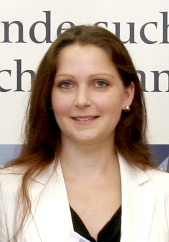News Archive
Nina Morgner joins CEF: From Oxford to Frankfurt
September 2013. CEF is pleased to announce that Nina Morgner has returned to Frankfurt as W1 Professor in Development of Mass Spectrometry.

ERC starting grant holder Nina Morgner
Nina Morgner studied physics in Freiburg and completed her diploma thesis in cluster physics on photoelectron spectroscopy of metal and half metal clusters. For her doctoral studies (2003 to 2008), she shifted her focus to the area of biomolecules and biomolecular complexes. During this time Nina Morgner applied her knowledge very effectively in the group of Bernd Brutschy in the Institute for Physical Chemistry. The research subject was the further development of the new mass spectrometry method LILBID (Laser Induced Liquid Bead Ion Desorption) with Bernd Brutschy and Hans-Dieter Barth. As part of this team Nina Morgner had the first opportunity to apply LILBID to a range of very challenging biomolecules, largely through a number of successful collaborations. LILBID has a great potential in der area of native mass spectrometry, especially with systems that are difficult to access with other mass spectrometry methods, such as membrane proteins and RNA complexes. The combination of studying samples of high biological interest with the instrument, while at the same time working on its further development proved to be very fruitful, allowing a direct response to problems or limitations.
In 2008 Nina Morgner joined the group of Carol Robinson at the University of Cambridge as a postdoctoral researcher, moving with Carol Robinson to Oxford University in 2010. During her post-doctoral research Nina Morgner learned to use state-of-the-art commercial mass spectrometers and worked on several collaborative projects. These include projects within the group, such as further development of mass spectrometry hardware. While studying large complexes, it soon became apparent that a major bottleneck to their interpretation was the highly complicated mass spectra that are very challenging to assign with commercial software packages. Nina Morgner therefore developed a new systematic assignment strategy and an associated software package.
In her new position in Frankfurt Nina Morgner plans to use and further develop native LILBID mass spectrometry for studies of the structure and function of non-covalent bio complexes. She then plans to apply LILBID together with the established ESI mass spectrometry, which is complementary in many aspects, to a wide range of challenging biomolecular systems. Her colleagues in CEF are looking forward to collaborate with her in addressing important research questions.
Contact
Nina Morgner
Institut für Physikalische und Theoretische Chemie
Biocenter
Goethe-Universität Frankfurt
Max-von-Laue-Str. 7
60438 Frankfurt am Main
morgner@chemie.uni-frankfurt.de

